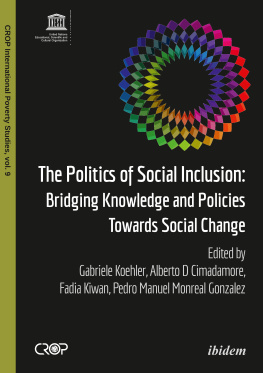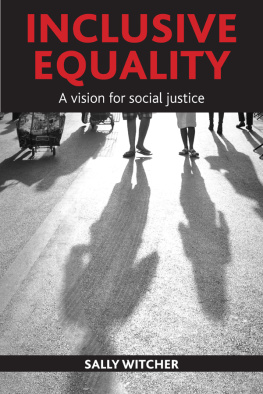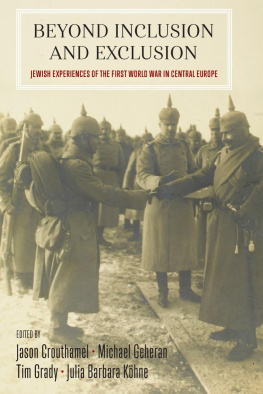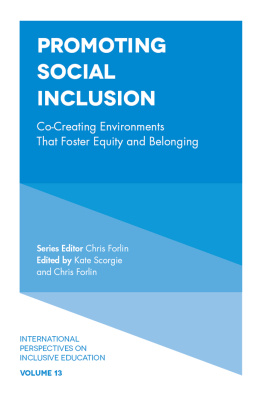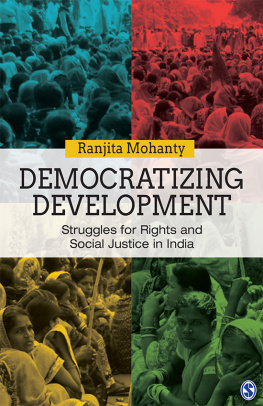ibidem-Press, Stuttgart
Contents
Acronyms and abbreviations
ACHR Asian Coalition for Housing Rights
ADB Asian Development Bank
APVVU Andhra Pradesh Vyvasaya Vruthidarula Union
BJP Bhartiya Janata Party
BNA Basic Needs Approach
BSP Bahujan Samaj Party
CBOcommunity-based organizations
CEDAW International Convention on the Eradication of all forms of Discrimination against Women
CEE Centre for the Economics of Education
CERD International Convention on the Elimination of All Forms of Racial Discrimination
CPRC Chronic Poverty Research Centre
CRPD International Convention on the Rights of Persons with Disabilities
CROP Comparative Research Programme on Poverty
CSEI Centre for Social Equity and Inclusion
DDA Delhi Development Authority
DFID (UK) Department for International Development
FAO Food and Agriculture Organization of the United Nations
GPI gender parity index
HDA human development approach
HDIHuman Development Index
IAYIndira Awas Yojna
IDS Institute of Development Studies
IIEP UNESCO International Institute for Educational Planning
IILSInternational Institute for Labour Studies
ILGI informal local governance institution
ILO International Labour Organization
IOM International Organization for Migration
ISCcould be a mistake
ISSCInternational Social Science Council
JNNURM Jawaharlal Nehru National Urban Renewal Mission
KCC Kampala City Council
KCCA Kampala Capital City Authority
MDG Millennium Development Goal
MGNREGA Mahatma Gandhi National Rural Employment Guarantee Act
MHUPA Ministry of Housing and Urban Poverty Alleviation (India)
MOSTManagement of Social Transformations
NBER (US) National Bureau of Economic Research
NCDHR National Campaign on Dalit Human Rights
NGOnon-governmental organization
NPEP National Poverty Eradication Programme
NSDFU National Slum Dwellers Federation of Uganda
OBC other backward castes
OHCHR Office of the High Commissioner for Human Rights
OPP Orangi Pilot Project
PATH Programme of Advancement through Health and Education
PCI Planning Commission of India
RAY Rajiv Awas Yojana
SCScheduled Castes
SDGSustainable Development Goal
SDI Slum/Shack Dwellers International
SESsocio-economic status
SIDS Small Island Developing States
SP Samajwadi Party
SRS Slum Redevelopment Scheme
ST Scheduled Tribes
UDHR Universal Declaration of Human Rights
UiBUniversity of Bergen
UNDESAUN Department of Economic and Social Affairs
UNDP UN Development Programme
UNDRIP UN Declaration on the Rights of Indigenous Peoples
UNICEFUN Childrens Fund
UNRISD UN Research Institute for Social Development
UPA United Progressive Alliance
WHO World Health Organization
Acknowledgements
This book has its origin in an international workshop organized by the Comparative Research Programme on Poverty (CROP) of the International Social Science Council (now the International Science Council (ISC)) and the University of Bergen (UiB), and UNESCOs Management of Social Transformations Programme (MOST), held at the UNESCO Headquarters in Paris on 67 July 2017.
The editors would like to express sincere thanks to the CROP Secretariat, the contributing authors, UNESCO, the International Science Council and the University of Bergen for all their support. A special thank you also to Katja Hujo (UNRISD) for critical insights, and to John Crowley, Jakob Horstmann, Sonja Keller and Maria Sollohub for steering the process.
Part I
Conceptual understandings of social inclusion
Chapter 1
THE POLITICS OF SOCIAL INCLUSION: INTRODUCTION
Gabriele Koehler, Alberto D. Cimadamore, Fadia Kiwan and
Pedro Monreal Gonzalez
A. The rationale for a volume on the politics of inclusion
Academics, policy-makers, civil society and concerned citizens across the planet are alarmed by the persistence of global poverty, the intensity of social exclusion and increasing inequalities. Multidimensional poverty continues to affect half of humanity. Inequality has reached unprecedented levels: according to Oxfams analysis, for example, in 2018, 26 people owned the same wealth as the 3.8 billion people who make up the poorest half of humanity (Oxfam, 2019; also see Piketty, 2014; UNRISD, 2018). Climate change impact and armed conflicts are wiping out many human development achievements of the past decades, frequently exacerbating existing patterns of social exclusion.
To redress the dystopian situation, the international community adopted the 2030 Agenda for Sustainable Development Transforming our World (United Nations, 2015), the Paris Agreement on Climate Change (UNFCCC, 2015), and designed a new urban agenda (UN Habitat, 2016). All of these have in common a commitment to norms and principles of social inclusion promising to end poverty and hunger in all their forms and dimensions and to leave no one behind. Leaving no one behind has been understood in a universalist and rights-based interpretation as including all people on the planet in sustainable and just societies. That would indeed be transformative of the dominant socio-economic orders, which have been reproducing and cementing poverty, inequality and social exclusion throughout history.
The status quo to be transformed is maintained by power relations which need to be addressed in order to produce sustainable economic, social, ecological and political inclusion for all. However, the structural transformations that would be required to unseat the dynamics of poverty, inequalities and exclusion are far less addressed, and do not feature expressly in the normative texts. Besides, the concept of inclusion is not defined, and therefore it is not possible to measure or evaluate progress toward the achievement of this goal, which is central to the general ambition to leave no one behind. In short, power relations tend to be ignored or overlooked in domestic and multilateral policy debates (UNRISD, 2016), and the absence of a clear understanding of what social inclusion means articulates the problematic on which this book intends to focus.
This volume was therefore conceived to address the power relations that both sustain and transform social orders marked by social exclusion, and to advance the understanding of the politics of social inclusion.
The collective construction of this understanding began with an international workshop held at UNESCO Headquarters, followed up in collaborative work between the editors and authors. This introductory chapter intends to synthesize and reflect on this process of collaborative knowledge production while advancing useful knowledge on the politics of inclusion. In order to do that, we first track social inclusion deliberations from two critical vantage points first, that of academic discussions which generally analyze the phenomenon of social exclusion, and second, from the discussion of social inclusion as it has informed debates and agenda-setting at the United Nations and related multilateral bodies, and at the European Commission. We then provide an overview of the two sections of the volume and their chapters. In closing, we sketch out a possible way forward regarding the research and policy nexus, trying to avoid jargon and unnecessary complexities to reach beyond the academic community.
B. Defining and understanding exclusion, inclusion and their political dimensions
Social inclusion presupposes in our view the realization of human rights, as laid out in the Universal Declaration of Human Rights (UDHR), and the UN Covenants on Economic, Social and Cultural Rights, and Political and Civil Rights. This general understanding needs of course to be contextualized within national and subnational legal orders that articulate states and societies around notions of justice which are not normally realized. The high levels of poverty and inequality are indicative of the structural violation of human, social, economic and cultural rights observed in many societies. In this view, social exclusion implies the denial to members of society of their basic human, political, social and economic rights guaranteed in international, national and subnational constitutions and legal orders. Rights are not realized for many reasons, principally because the excluded and the poor have limited or no access to the institutions of justice, and therefore are usually powerless in systems structurally biased against them. In this general context, the politics of inclusion refers to the power relations evolving within historical forms of states and international relations where asymmetrical economic, social and political orders tend to exclude large segments of the population (Cimadamore, 2008; UNRISD, 2018).

